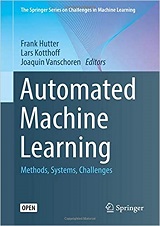
|
FreeComputerBooks.com
Links to Free Computer, Mathematics, Technical Books all over the World
|
|
- Title: Automated Machine Learning: Methods, Systems, Challenges
- Author(s) Frank Hutter, Lars Kotthoff, Joaquin Vanschoren
- Publisher: Springer; 1st ed. (May 28, 2019); eBook (Open Access, Creative Commons Licensed)
- License(s): CC BY 4.0
- Hardcover: 233 pages
- eBook: PDF (223 pages) and ePub
- Language: English
- ISBN-10: 3030053172
- ISBN-13: 978-3030053178
- Share This:

|
This open access book presents the first comprehensive overview of general methods in Automated Machine Learning (AutoML), collects descriptions of existing systems based on these methods, and discusses the first series of international challenges of AutoML systems.
The recent success of commercial ML applications and the rapid growth of the field has created a high demand for off-the-shelf ML methods that can be used easily and without expert knowledge. However, many of the recent machine learning successes crucially rely on human experts, who manually select appropriate ML architectures (deep learning architectures or more traditional ML workflows) and their hyperparameters. To overcome this problem, the field of AutoML targets a progressive automation of machine learning, based on principles from optimization and machine learning itself.
This book serves as a point of entry into this quickly-developing field for researchers and advanced students alike, as well as providing a reference for practitioners aiming to use AutoML in their work.
About the Authors- N/A
- Machine Learning
- Deep Learning and Neural Networks
- Artificial Intelligence
- Data Analysis and Data Mining

- Automated Machine Learning: Methods, Systems, Challenges (Frank Hutter, et al.)
- The Mirror Site (1) - PDF
-
 Metalearning: Applications to Automated Machine Learning
Metalearning: Applications to Automated Machine Learning
This book offers a comprehensive and thorough introduction to almost all aspects of metalearning and Automated Machine Learning (AutoML). It can help developers to develop systems that can improve themselves through experience.
-
 Foundations of Machine Learning (Mehryar Mohri, et al)
Foundations of Machine Learning (Mehryar Mohri, et al)
This book is a general introduction to machine learning. It covers fundamental modern topics in machine learning while providing the theoretical basis and conceptual tools needed for the discussion and justification of algorithms.
-
 Machine Learning Yearning (Andrew Ng)
Machine Learning Yearning (Andrew Ng)
You will learn how to align on ML strategies in a team setting, as well as how to set up development (dev) sets and test sets. After finishing this book, you will have a deep understanding of how to set technical direction for a machine learning project.
-
 Dive into Deep Learning (Aston Zhang, et al.)
Dive into Deep Learning (Aston Zhang, et al.)
This is an open source, interactive book provided in a unique form factor that integrates text, mathematics and code, now supports the TensorFlow, PyTorch, and Apache MXNet programming frameworks, drafted entirely through Jupyter notebooks.
-
 Understanding Machine Learning: From Theory to Algorithms
Understanding Machine Learning: From Theory to Algorithms
Explains the principles behind the automated learning approach and the considerations underlying its usage. Provides an extensive theoretical account of the fundamental ideas underlying machine learning and the mathematical derivations.
-
 Machine Learning from Scratch (Danny Friedman)
Machine Learning from Scratch (Danny Friedman)
This book covers the building blocks of the most common methods in machine learning. This set of methods is like a toolbox for machine learning engineers. Those entering the field of machine learning should feel comfortable with this toolbox.
-
 Reinforcement Learning: An Introduction, Second Edition
Reinforcement Learning: An Introduction, Second Edition
It provides a clear and simple account of the key ideas and algorithms of reinforcement learning that is accessible to readers in all the related disciplines. Focuses on core online learning algorithms, with the more mathematical material set off in shaded boxes.
-
 Probabilistic Machine Learning: An Introduction (Kevin Murphy)
Probabilistic Machine Learning: An Introduction (Kevin Murphy)
This book is a comprehensive introduction to machine learning that uses probabilistic models and inference as a unifying approach. It is written in an informal, accessible style, complete with pseudo-code for the most important algorithms.





